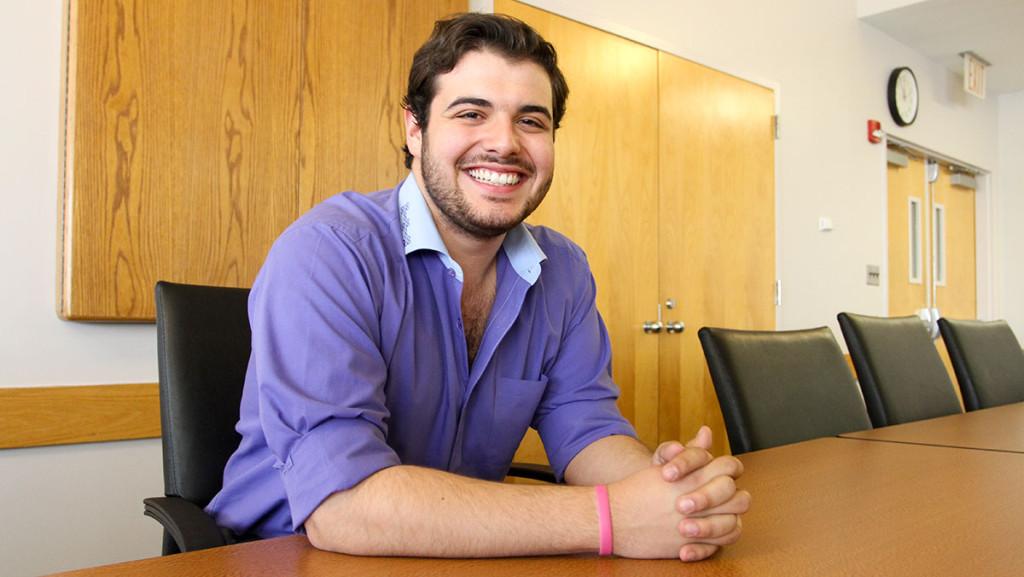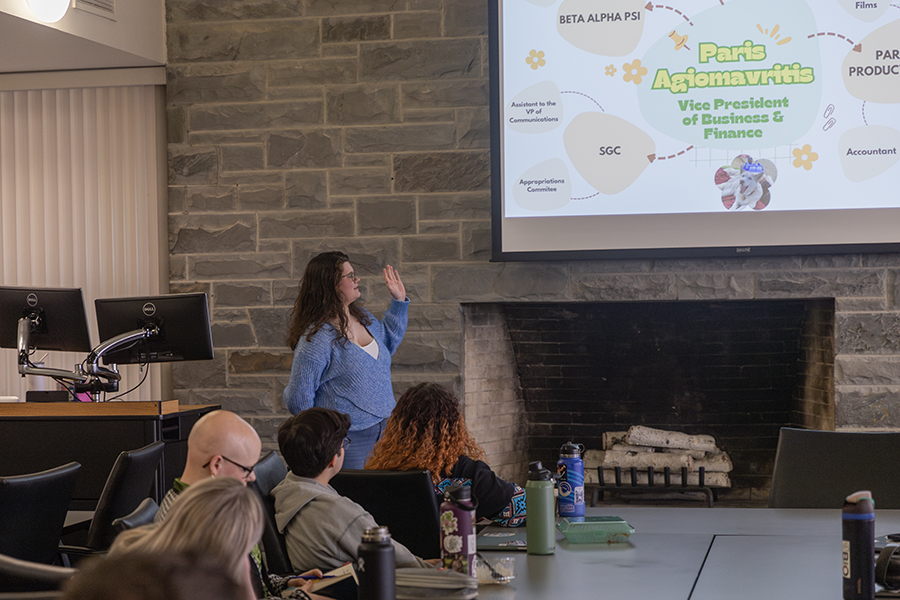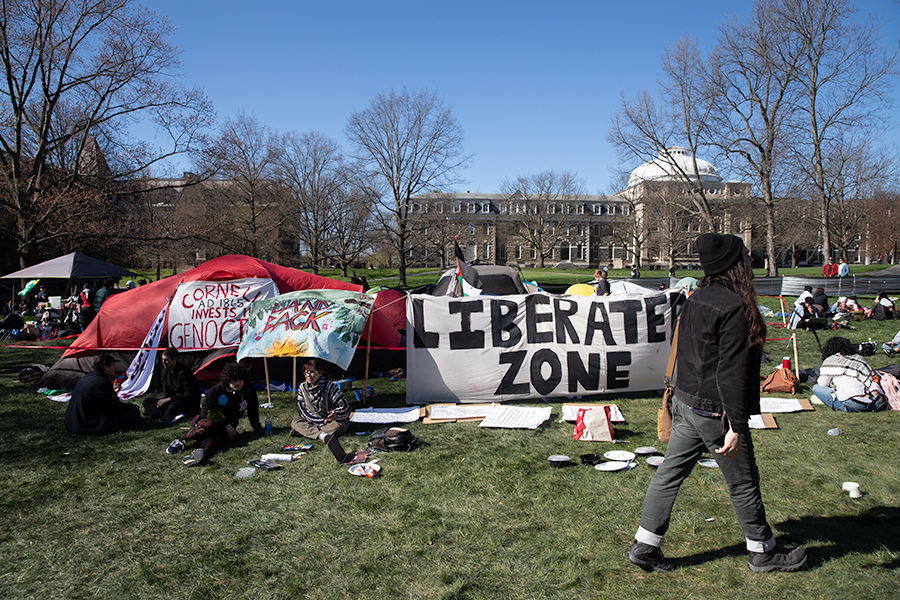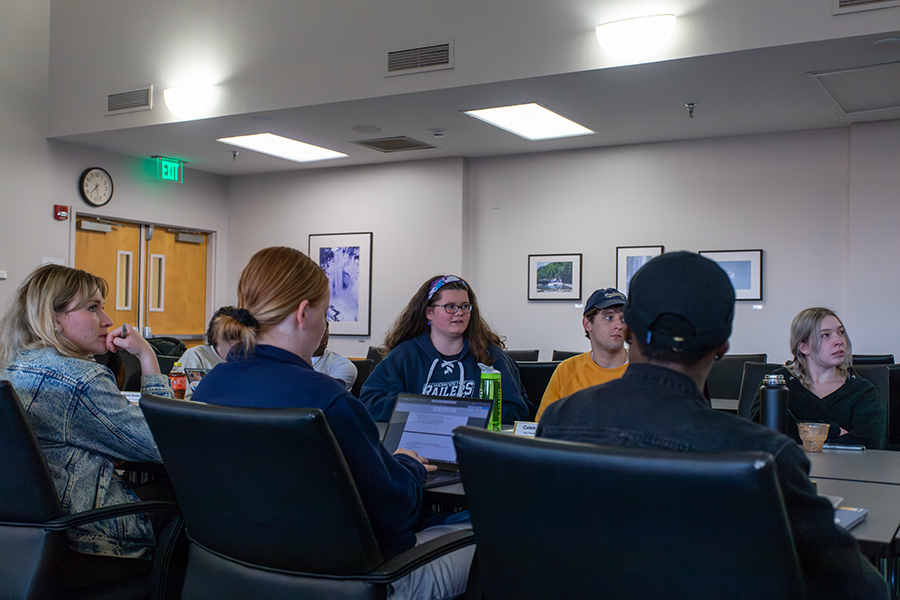Dominick Recckio’s ticket, IC*NSYNC, narrowly won the Ithaca College Student Government Association Executive Board election April 24.
Online News Editor Max Denning spoke with president-elect Dominick Recckio about his plans to facilitate the creation of a student bill of rights, the possibility of more club collaboration and his other plans for next year.
Max Denning: When we talked on election night, you said the first thing you wanted to do in office was implement a student bill of rights. Can you explain your plans for the initiative?
Dominick Recckio: First off, I won’t give any example rights because I think that it can’t come from me, it has to come from a collective of students. I’m going to be here this summer putting together meetings with administrators that have to do with the Conduct Code. I plan on meeting with many administrators on what the process would look like in adding to the Conduct Code. As soon as the semester kicks off we’ll involve students [with] open forums. I’m thinking of moving the SGA meetings out of the Taughannock Falls [Room] to a better space. I think we will also be inviting specific groups of students to these meetings as well. Inviting the ALANA [African, Latino, Asian and Native American] community, inviting students in student media … We’ll be potentially building out a Web forum where people can add things they think they have the right to. Having a draft by October 1 is a definite goal.
MD: What policies does your executive board plan to have when it comes to the act, or the want to consolidate clubs?
DR: I don’t know what the actual policy will look like. I think it’s going to be an incentives-based program. This summer, [Vice President of Business and Finance] Evan Layne and I are going to get as much data as we can get from the Appropriations Committee, from OrgSync, from back on IC Link (the predecessor to OrgSync). Here’s all the organizations we have, here’s all the spending that we’ve done. I want to get a master list of all the events from different organizations and look at where there are the redundancies with events and organizations. The policy will be more of an incentive. Instead of funding two organizations for similar events, we’ll build out a better system for them to come together … If the Appropriations Committee sees two similar events that have happened year after year, we’re going to make sure they coincide with each other and people go to the event.
MD: Will there be any action to make two clubs combine if they’re not putting on similar events, but they have a similar mission?
DR: There will be no forcing of anyone’s hand. I don’t want to create a policy that forces clubs to reorganize and consolidate. I do want to create some sort of incentive program where we show them the benefits if they so choose. We have way too many events that are unattended.
MD: Moving forward, another large controversy the SGA dealt with this year was the microaggressions reporting system. Sean Themea, who was against having a microaggressions reporting system, came very close to winning. Does your executive board have any plans for this type of system?
DR: First off, I would like to highlight that the bill process today — before the organizational review committee’s ideas on the process gets put into place, hopefully in a few weeks — allows for an idea to be passed by a group of students. The idea was a microaggressions reporting system; — it was passed through the Student Government Association. They’ve been having, probably, meetings with administrators to get this implemented, eventually. So it’s not a set in stone, ‘The college is doing this.’ The college still has to say, ‘Okay we’ll do this.’ So, I think it got hyped up really big, really fast ….
I actually think it’s a good idea … We agree with the reporting system, our executive board, we like the spirit of the bill. We really hope it does happen.
Awareness campaigns don’t work very well on this campus. It is really hard to get people aware of something. The microaggressions awareness campaigns have been happening for two plus years, and when that hasn’t been entirely successful, not for a lack of trying … I think they’ve come to the realization that these microaggressions aren’t stopping … Holding people accountable or at least giving people who are experiencing these microaggressions — an avenue to express the fact that they feel unwelcome, or something hurts their feelings, or affects them negatively — they should totally have an avenue for that.
MD: Do you have any specific plans for pushing administration to create both an LGBT and indigenous studies minor, as you stated in your platform?
DR: I don’t understand all of the issues around indigenous studies. I went to some of The Collective events, and I’m all about it and so is my executive board. We have a Native American studies minor, it’s just a matter of aligning the curricula and the potential tenure-track position, which we will definitely push for, with some of the goals the students have brought up this year in those conversations.
When it comes to LGBTQ studies minor, I know [Vice President of Academic Affairs] Kyle James has been working day-in and day-out on making that happen. We know there are courses on this campus that could be put together into [an] LGBTQ studies minor. We don’t think it should take as long as the administration takes on some things. If we have to convince people, we’ll convince people. If we have to put together a list of all the courses and why they should be included in the minor, we’ll do that … This is one of our top things we want to make happen.
Something else we’re looking to do with the “blue-sky” is we have an awesome chance to help bring as many students as possible to the administration about designing the future for this college … Something we’ve already started discussions about is to hold, throughout the year, focus groups, student-led with every single academic program on the campus. Bringing together students from every single one of the about a hundred majors and asking them questions: “What are the best parts of what they’re learning? What are the worst parts? What specifically do they like? What do they specifically not like?” Taking a really good critical eye to all of that and eventually at the end of the year creating a really kick-ass report to the administration that says, here’s a student review of the academics at this college. But not just a review, we’re going to be asking the questions: “Where do you see [your major] in 2050? … How can we align our academic programs for you when you’re in the peak of your career in 2050, be absolutely on top of your game and consistently draw on what you learned here,” really building out that. It’s going to be a ton of work, and it’s going to take a lot of time, but if we want to give the student voice to the administration, I would love to just be able to drop it on their desk. “Here it is, a complete student review of the academic programs.” … The skies are blue.
MD: If you could play puppet master for a day at IC and change one thing, what would it be?
DR: I would put students on the President’s Council … The President’s Council, as I know it, is the president and the vice presidents of the college … I would like — and it doesn’t have to be the student body president — a student to be as important to this administration as the vice president of enrollment, or the vice president of institutional advancement, or the vice president of business and finance, or the provost, or the general counsel … Putting a student who engages civically, but actually really cares about student affairs and campus life is a huge ask, but if I had to be puppet master for a day, I believe that would bring some serious change. We have a student on the Board of Trustees, and they’ve done some great work. I would like to see the college carry that commitment too … If your tuition drives this institution, your voice should too. If we’re not at that table, we’re not being taken as seriously as we could.
MD: What’s your biggest fear, or what worries you the most for the next year during your time as SGA President?
DR: What worries me the most is I have a lot of things that I’ve built out with my team, and I will be pretty darn disappointed in myself if we don’t work to accomplish every one. It’s just a matter of making sure that we can have the most positive change.








